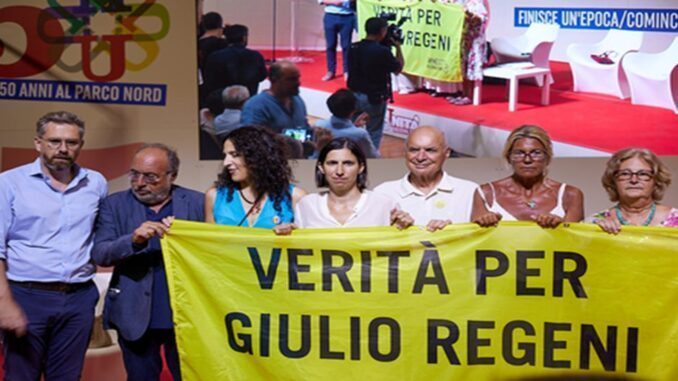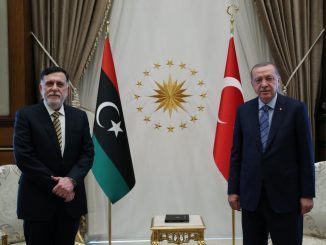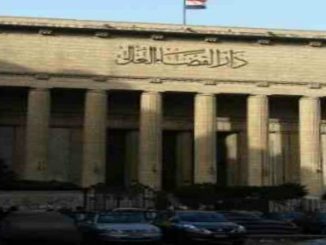
Italy’s Constitutional Court on Wednesday, September 27, 2023 ended a stalemate on the trial in absentia in Italy of four Egyptian intelligence officers on suspicion of torturing to death Italian student Giulio Regeni in Cairo in early 2016.
The top court ruled that the trial could proceed even though the officers have not been informed of the proceedings against them, as Cairo has refused to cooperate on the case.
Italy’s Constitutional Court started examining an issue that has led to a deadlock in the trial of the alleged killers of Giulio Regeni on Wednesday 20 September.
Regeni, a 28-year-old Friuli born Cambridge University doctoral researcher into Cairo street seller unions, was tortured to death in Egypt between January 25 and February 3 2016.
His work on Egyptian trade unions was politically sensitive and his body was so badly mutilated his mother only recognised him by the tip of his nose.
A Rome judge had asked the Constitutional Court to rule on whether the trial can proceed without the presence of the four Egyptian security agents who have been charged in Italy with his murder and without any proof that they know they are on trial.
The Egyptian authorities have not cooperated with Italian efforts to formally notify the suspects that they are on trial, which had prevented proceedings moving forward.
Efforts to notify the four officers – National Security General Tariq Sabir and his subordinates, Colonels Athar Kamel Mohamed Ibrahim and Uhsam Helmi, and Major Magdi Ibrahim Abdelal Sharif – have been unsuccessful and Egypt has not cooperated by handing over their contact details and legal abodes.
Regeni’s story
On 25 January 2016, Giulio Regeni, a PhD student at the University of Cambridge, disappeared while carrying out field work in Cairo, Egypt. His tortured body was found in a ditch nine days later, on 3 February.
After six years, Egypt is still denying any responsibility in the matter and the perpetrators of this crime are still walking free. Yet, the battle for truth about Regeni’s murder has never been more important.
Giulio Regeni’s murder was not only an unprecedented and unacceptable attack on the principle of academic freedom. It was a crime that revealed the scale and brutality of the counterrevolutionary repression under way in Egypt, as well as Egypt’s sense of impunity in the face of it.
Although four officers of Egypt’s National Security Agency have been officially charged in the trial under way in Rome, the proceedings are currently stalled after Egypt’s denial of any involvement in the matter and its refusal to let its agents be tried by a foreign state.
Egypt’s impunity, however, is only one side of the story. The other side concerns European governments and their complicity with the regime of President Abdel Fattah al-Sisi. Egypt has recently become the third largest arms importer in the world, behind only Saudi Arabia and India.
Military imports have more than doubled in the last five years, compared to the period between 2010 and 2015. Egypt is now on course to acquire the biggest maritime capability in the region – and, for this, it should thank its European allies, especially France and Italy.
Sisi’s alliance with Macron
Between 2013 and 2017, France surpassed the United States to become the second top provider of arms to Egypt after Russia. (It remains to be seen whether the latest arms deals between the US and Egypt will change this ranking.)
A third of all Egyptian arms imports currently comes from France, while a quarter of all French military exports go to Egypt. French arms exports have registered a 40% increase in the last five years – an increase directly driven by demand from the Middle East, in particular from Egypt.
The scale and depth of cooperation between Egypt and France goes beyond statistics. Just before Christmas, documents codenamed ‘The Egypt Papers’ were leaked by the French investigative journalism website Disclose.
Memos prove that between 2016 and 2018 France participated in a series of targeted killings carried out by Egyptian armed forces on the border of Libya and Egypt. But they also detail the steady supply of surveillance software by four French tech companies – software that was regularly used by Egypt to monitor and target internal opposition.
The fact that France may have – literally – armed al-Sisi’s repression was not lost on the French judiciary, who recently tried four executives from the French tech companies involved and found them guilty of “complicity in torture and enforced disappearance in Egypt between 2014 and 2021”.
Italian arms exports
In 2019, Egypt also officially became the top client of Italian weapon exports. It remained Italy’s number one client in 2020 as well, with a volume of authorised transfers that has increased exponentially between 2016 and 2020: from 7m euros in 2016 to 60m in 2017, 800m in 2019, and almost 1bn euros in 2020.
This staggering growth is due not only to the quantity of arms sold to Egypt, but to the type of weapons involved. The upward trend started in 2015, under Matteo Renzi’s government, with a significant increase in the export of small arms, light weapons and surveillance software – this was already in breach of Italy’s own laws banning arms transfers to countries violating human rights, or engaged in conflict.
But the flow of arms transfers significantly changed gear in 2019, when Italy and Egypt struck a historic deal – historic for both countries – for the selling of complex weapons systems.
Aside from the two frigates that have already been delivered, this includes another four frigates, 24 Eurofighter jets, a military satellite and 24 light combat aircraft. Most of this equipment would be produced by companies that are part-owned by the Italian state, such as Fincantieri.
Western hypocrisy
Between 2016 and 2020, therefore, just as repression by the al-Sisi regime was escalating following Giulio Regeni’s murder, military cooperation between Egypt and its European partners intensified dramatically. The fight against terrorism – a much-loved mantra on both sides of the Mediterranean – served as the ideal pretext for a process of rearmament that benefited, in particular, private defense contractors and government elites in Egypt and Europe.
Furthermore, these arms sales, often financed by loans sponsored by weapons-exporting countries, were instrumental in creating even more interdependence, not least financial, between the two shores of the Mediterranean, so much so that now European governments have a direct stake in al-Sisi’s survival.
Ten years after the Arab uprisings, and despite its early support for the struggles and demands embodied in those mass protests, Europe seems to have rediscovered its love for dictators. Its cynical approach has often been justified in terms of putting interests over values. However, this is a false dichotomy in more than one way.
Europe’s credibility gap is widening in the MENA region. This is in no small part due to the fact that, as an Egyptian human rights lawyer recently said, European governments “are behaving like enemies of democracy”, rather than like democratic states keen to help other countries transition towards democracy.
The reputational damage abroad is considerable, but so is the danger that, in a boomerang effect, democratic standards will start being eroded at home too – a process that is, in fact, already happening in Europe.



